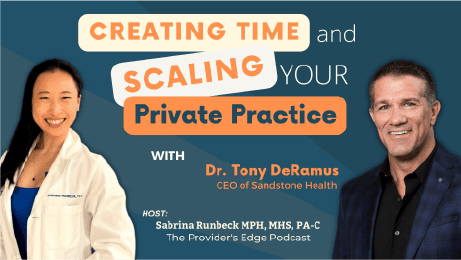
What's more valuable?
Time or Energy
Management
1. Feeling exhausted and overwhelmed at the end of the day
2. Wasting time on tasks that could have been avoided
3. Missing out on important events because of a lack of time
If you've been feeling this, then this episode is for you!
I broke down for you why energy management is more important than time management and how you can improve your productivity.
"Time management may give you the time to spend with the people and projects you want to engage in. But energy management ensures that the time you spend with them is high-quality time."
In this episode, you will learn the following:
1. The importance of energy management over time management
2. The different types of energy cycles that people experience
3. How to optimize productivity by understanding your own energy fluctuations
Subscribe ? and listen ?to this episode now and find out which strategy is more valuable to you: time management or energy management?❗
Listen anywhere you get your podcastin' on.
Show Summary
"Pay attention to what consumes your attention"! ___Adam Graham
No matter how well we've planned our time, it would be difficult to focus and be productive if our energy is low. Time management strategies for healthcare practitioners or leaders are important, but often it is not as valuable as energy management strategies.
Today I am going to discuss some practical strategies that would help you to change the status quo "healthcare workers are always burned out and never have enough time or energy." Plus, they would guide you on which set of strategies is more helpful in your case: time management or energy management.
Time and Energy Management Strategies
1) Behavior Change In Time and Energy Management
Have you heard of this story? A man walks down the street, and he sees a dog moaning. He turns to the guy sitting next to the dog and asks, is this dog in pain? Why is he moaning? The person responded, yes, it's in pain because it's sitting on a nail. The observer then proclaimed, Sit on a nail? Why doesn't he just move out of the way? The second man answer because it's not painful enough for him.
How often have we done the same thing as high-achieving medical, dental, and holistic practice owners?
Here the key is behavior changes are hard, especially with a desire for high performance. We have a lot that we want to do for our career, our practice, our patient, and ourselves. Even those who have realized that are still having difficulty with new adaptations. So, the first and foremost thing is behavior changes.
No matter what you choose to manage or change. Each will require mental adjustments on how you see yourself as a leader, a financial generator, and a societal contributor.
2) Pomodoro Technique of Time Blocking
We know time management is traditionally the foundation of productivity. Methods like the Pomodoro Technique of Time Blocking show how, when used correctly, can complete tasks much more efficiently. No doubt, these methods are valuable, and it helps me also to roll map dozens of things.
In the Pomodoro Technique of Time Blocking, you take a five-minute break after 25 minutes of focus. Interestingly, many TV shows and events also use this technique. TEDx presentations, for example, it's limited to just 18 minutes. Neuroscientific studies have shown that human concentration is around 20 minutes.
You have to spend your time wisely. The Pomodoro technique won't help if you do not have a clear idea of which tasks will produce maximum results. Doing the wrong types of work will keep you busy but not help you to move forward in the direction that you need to go. Therefore, the Pareto principle is important here. On top of that, if you are in a state of fatigue or brain fog, then doesn't matter how many time blocks you set, you won't produce good results.
When your energy is trending down, you can reset it by taking a two-minute mental vacation.
I like to use a Pomodoro technique only when aligned with my peak performance hours based on my natural energy cycle. Then, I focus on only one major task for that block. This is only one small pillar within the bigger umbrella of being an effective and efficient leader!
3) Identify Which Chronotype You Are
I mentioned that I tend to schedule the most concentrated work during my peak performance hours. Have you found what those hours are in your day? If you haven't heard, we only have 2-3 hours of peak performance hours by research. Let me show you now how to identify those hours in your day.
Did you know that the general population has four types of energy cycles? What's called chronotypes. Each one of these chronotypes is a dominant circadian rhythm that peaks at different times of the day. So, if you can identify which chronotype you are, you can start understanding when your energy is naturally at its peak.
There are morning people, those who feel the most energetic at the crack of dawn, evening people, and those who feel the most energetic at night. Additionally, there are also two in-between types. Some people feel the most energetic at midday and others feel no rhythm at all.
Each of us has a natural energy cycle based on how much we can feel concentrated on what we're doing and how our energy fluctuates. Therefore, we can leverage specific set hours in our day where we're most focused to be most productive.
4) Proper sleep is very important
It is vital to have proper sleep habits, not only for energy management but also for time management.
According to sleep studies, even a single night of missing sleep affects cognitive performance. When we don't get enough sleep, at least 5 hours per night, language and numeric skills, retention of information, short-term memories, and concentration all decrease on standard testing.
Time is constrictive because there are set times to do such things. Energy is flexible. It's an element of choice to do certain tasks at a certain time. Time is infinite and out of control. Energy is renewable and in your control. For this reason, sleep really comes down to a matter of choice and opportunity.
5) Audit your Energy
An energy audit aims to identify what activities give us energy and what drains it. You can use it to understand how your energy level fluctuates and the seasonality of your life. Thereby, you can actively choose what to focus on and when to do them. Ultimately, how to replenish your energy to take better care of yourself and be able to reset and reboot your energy state.
An energy audit is simple. For one week, track everything you do and how each activity makes you feel? Is it positive, negative, or neutral? At the end of the week, analyze your activities and find ways to do more of the things that make you feel good. This will also help you track your image flow and determine your peak performance hours and hours that you are more likely to drain to create a pattern.
6) Set your actual projection of life after being a successful healthcare professional
What is your actual projection of life when you become successful being a provider and a leader?
How do you want to live your life while impacting your community? Through medicine, dental or holistic care.
If you haven't figured out this answer yet, go to the episode published on June 15 called “How to be a Finisher, not Just a Starter in 3 Steps”.
Final Thoughts
Time management may give you the time to spend with the people and projects you want to engage in. But energy management ensures that the time you spend with them is high-quality time.
Today we discussed how to identify strategies to gain time and energy. The best use of our time is on what we can control energy versus what we cannot control, which is time. Time has no bounds, and it's continuous. If we put a restraint on time, then we will constantly see it as something we're lacking, a scarcity consciousness, instead of being a continuation, which is an abundance consciousness.
Additional Resources: Find out your chronotype: https://thepowerofwhenquiz.com/ Read about your chronotype: https://www.healthline.com/health/chronotype Subscribe to our weekly newsletter on LinkedIn here: https://www.linkedin.com/pulse/which-strategy-more-valuable-time-management-energy-sabrina/
Recommended Podcast Episodes
Ep 55
Embracing Food Identify:Healing modern-day gut issues through traditional healing foods with Dr Sara
Be a guest on our show
Powerful and Passionate Healthcare Professionals Podcast is always looking to feature healthcare private practice owners to highlight their work and their stories.
Together, we can encourage other practitioners to up level their practices.If you or someone you know could be a good fit as a guest on the show,please click on the bottom below to apply as a speaker.
Healthcare Private Practice Owners
I can help you run a peak performance team while gaining you a day per week!After overcoming burnout working in surgery, I went back to my roots in neuroscience and public health helping healthcare practice owners and their teams to develop mental immunity so they can do less, achieve higher, and enjoy more.My clients stop having endless to-do lists, constantly putting out fires, or are not able to move steadily forward.If you want to gain a day per week and increase your team’s productivity... then you have landed on the right page, with the right consultant who is also a recovered clinician.




